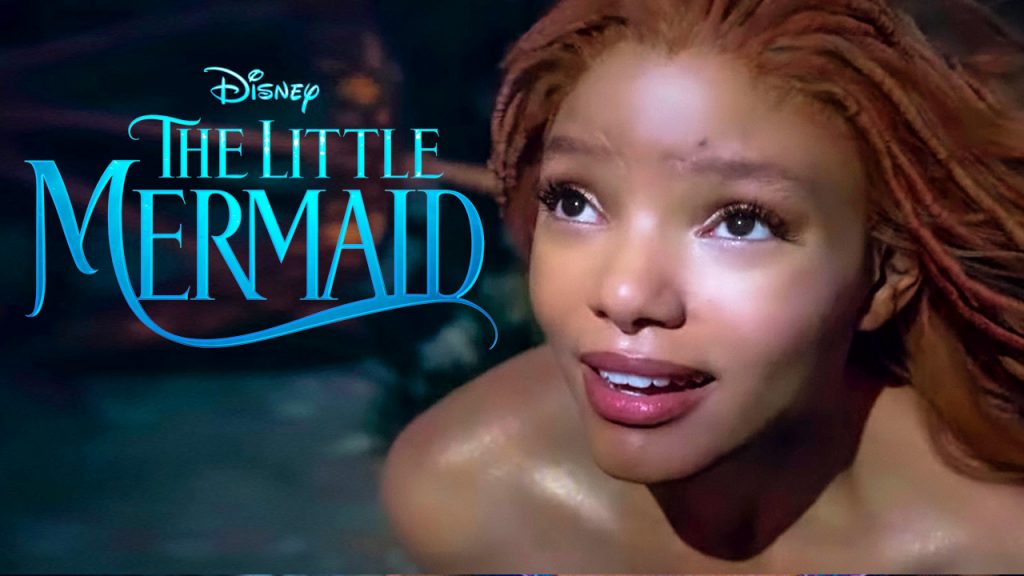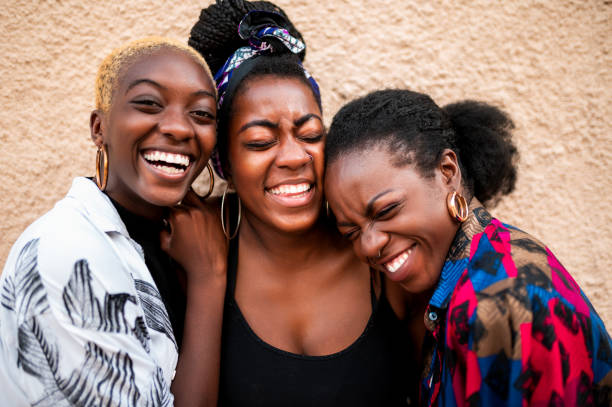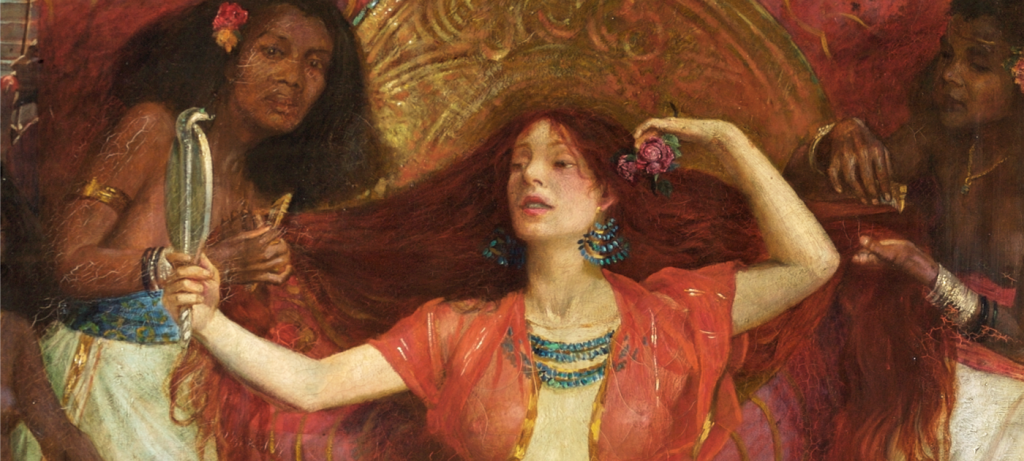(ThySistas.com) A couple of days ago I saw The Little Mermaid at Regal Cinemas. The beginning opened with the wild waves of an ocean crashing against itself and a beautiful quote by Hans Christian Anderson saying, “but a mermaid has no tears, and therefore she suffers so much more.” Amongst all the nostalgic musical arrangement, awe-inspiring digital choreography, and wholesome story building I found myself enjoying every moment of the film—and I was not alone in my assessment! The live action mermaid ensemble received a ninety-five percent approving audience score and rave reviews across the board. So, if everybody loved the actual movie, what was with all that noise back when the film was announced to debut black actress and singer-songwriter, Halle Bailey? Why are there reports of mobs socially hate-bombing movie review sites to cast a negative light on a movie they are not actually watching? Is this going to have to be another conversation about blanket racism, or is there something more covertly sinister afoot?
The Woke Agenda
Oh yes, the both simultaneously-championed and ultimately demonized term, “woke.” The loudest protestors of the casting choice in this movie can also be found tossing around that term in the American political sphere. Terms affiliated with wokeness are “diversity” and “inclusion” and often brew up a bigger issue to them than just a child-friendly, Disney princess. In fact, The Woke Agenda, as it is defined on Quora Politics, is “a person/business/organization who believes they are progressive in their thinking and ideas but are actually backwards, bigoted, and racist depending on the topic.” The definition itself is very polarizing and many people would come to blows with just that alone. So, how can we break this down into more digestible chunks?
My mother had a perfect example for this wokeness definition.
Picture yourself at a beach with a stranger. You both are walking along the stretch and you come across a symbol written in the sand. Someone had drawn a fancy number and left it there as a message to all who come after. “It’s a six,” you say. “No, it’s definitely a nine.” You are on one side and they are on the other. Simple enough, until you add context. Let’s say that you’ve both read individual fortune cookies before strolling the beach. Your fortune said six is your lucky number and you’ll win a million dollars tomorrow. The stranger’s fortune said nine is the number of luck, and six is the number of doom and apocalypse. Now, neither of you are willing to budge from your perspective because budging, to you at least, means losing everything and gaining nothing.
These are the kinds of ditches we walk ourselves into when even our definitions lead us into a place of division. The original term “woke” meant to ‘be alert to racial prejudice and discrimination.’ It was soon broadened in the 2010’s to (much like an alternate fortune) encompass endless other ideals. The people on the beach feel like they are the championed ones meant to demonize the other when they are in fact two sides of the same troubling coin.
Whitewashing and Racebending in Film
We cannot even begin to understand the controversy behind casting a black woman as a fictional mermaid princess without first discussing the impact of changing the race of any character at all. “Racebending,” defined by Wordsense, is an informal term “to describe the act of playing the role of or casting someone in the role of a character of a different race or ethnicity.” While Merriam-Webster defines “whitewashing” as “altering something in a way that favors, features, or caters to white people…white actors cast in a nonwhite role.” To the casual eye, it could seem like racebending and whitewashing aren’t simply two sides of a coin, but the same side and the same coin. Writer Janna G. Noelle notices this and disagrees. In her article she argues that most beloved white characters were never written white at all. For characters such as Hermione Granger and Katniss Everdeen, inexplicit descriptions were used purposefully, opting instead to call them ‘olive-skinned’ or ‘frizzy haired.’ These characters were not white all along, but were interpreted as white much later by the casting directors. Noelle goes on to write “such is our society that in the absence of definitive racialized descriptors…the default human race is white.”
Some at this point may argue, does it even matter? Emma Watson did an amazing job as Hermione, and Jennifer Lawrence is Katniss Everdeen! What does the color of their skin have to do with the story?
Sometimes nothing. Other times, everything.
Noelle explains in her article that “racebending is transformative in the way that whitewashing isn’t.” Racebending adds a richness the same way adding lemon to water changes the flavor but not the water itself. For example, imagine going to see Patty Jenkins’ Wonder Woman and out walks Angela Bassett as Diana. Gal Gadot is an Israeli actress and did an amazing job as the Amazonian superwoman, but do you deny that a black woman trying to fight in a World War wouldn’t turn additional heads? Walking through that time in America as a brown-skinned demigod would definitely add flavors to the backstory that deepen the experience of the movie for bigger audiences.
Alternatively, what exactly did casting British-American actress Elizabeth Taylor add to the role of Cleopatra in 1963? Aesthetics? Star-power? Maybe. But what did it take away? Quite often the act of whitewashing a role forms a shadow over the very culture the film is tasked with highlighting. Take 2017’s Ghost in a Shell for instance. When Scarlett Johannson was cast to play Motoko Kusanagi derived from the popular Japanese anime-manga series, fans weren’t shouting their praises toward Hollywood, they were protesting. In her article Eliza Berman writes, “in some instances, it is not a case of an Asian role going to a white actor, but a bankable white movie star headlining a story that originates or takes place in Asia, like Matt Damon’s The Great Wall or Finn Jones in Marvel’s Iron Fist on Netflix.” Casting a white actor/actress just because of their star power with no consideration for how it takes away from the story of the minorities featured in it does exactly what racebending does not.
Brandy in Cinderella as the title girl herself, along with Whitney Houston as her magical fairy godmother is yet another instance of racebending adding flavor—not as an insult or shadow over the original, but as something of its own to expand on. No one would say that lemon water is no longer water. So, why would a black princess or a black mermaid no longer be true to the original story?

Princess Tiana vs. Black Ariel
Okay, I’m not naïve. I know things aren’t all kumbaya and happy town over there at Disney Studios. In fact, black people have been known to complain about black characters too. When Princess Tiana was announced to be Disney’s first black princess, there were black women upset about her having to kiss frogs, black people complaining about her screen time being dominated by being a frog, and upset that the Prince Naveen design veered away from traditional black male features. These comments greatly annoyed the animators, one in particular a black man credited with other Disney work like Snow White, causing him to say that overly racialized people take the fun out of animating altogether. By the time that Ariel was announced to be Halle Bailey, it seemed critics of another side issued their complaints as well. But when we take a look at the content of their discomfort, it wasn’t at all about whom Ariel would be kissing, what she’d be singing, or the time she’d get on screen…it seemed like it was just because she wasn’t white.
In an analysis on CNN Entertainment, AJ Willingham accurately debunks claims meant to shield subtle racist protests against a black Ariel. Online trolls said Ariel should be white because she is Danish in origin, to which Willingham politely reminds them that the short story says Ariel is from “far out in the ocean at the bottom of the sea.” No descriptive specificity for her race (and as we’ve established you don’t get to be default white). The next most popular argument against a black Ariel claimed a European monopoly on mermaids! Willingham again refutes this by illuminating the many Asian, Middle Eastern, and African folklore depicting underwater kingdoms, spirits, and ocean beings that take the shape of beautiful women.
While black people were up in arms about the representation discomfort they felt Princess Tiana could bring through the actual plot of the story and character interaction, those online trolls against Halle Bailey acting as Ariel rejected her due to her skin color and hair.
Pot and Kettle Fallacy
Worry not, we aren’t overlooking the blatant racial pandering. We are aware that some big studio versions of “diversity” and “inclusion” (oh no it’s all woke now) means grab the nearest woman and BIPOC actress to redo a role! We know that every interview with Halle is going to center around the fact that some little girl somewhere can ‘see herself and know she can be a princess too.’ We have seen this before, remember? During the release of Disney’s The Princess and the Frog, an article from The Associated Press took in the demographic of excitement and found it… surprisingly aged. It wasn’t the children taking photos and jumping on their bedsprings, it was mothers. In 2009, Malia and Sasha Obama were already the norm for kiddos youth, they had that representation, and the article noted “the historic nature doesn’t seem to resonate.” Black mothers who had grown up without that black princess, without a black First Family, without a black mermaid are the ones needing the healing of seeing one now. In an effort to show their children that your skin color won’t hold you back from your dreams, they are igniting more excitement and therefore fanning the flames of pander-minded Disney executives—of whom are still predominantly white and male. This, in turn, reignites the protests of those who smell the pandering and do not find themselves centered in the rewards promised, ushering in their vitriol.
And round and round we go.
The pot calling the kettle black is an idiomatic expression representing hypocrisy and projection. The pot is getting black and greasy just like the kettle is, and yet here they are. Here we are on the beach, staring at the number in the sand. Here we are talking about a movie for kids like it’s the next socio-political battlefield.
The original Little Mermaid came out in 1989. Art is reflected by its current society. It is now 2023. Why is there so much surprise at the change? Why is there so much controversy? Why are we all acting like frown-locked adults lined up against another slippery slope argument? Picture your niece and nephew or your child watching the characters they love come to life on a humongous screen. Ask them what they thought of the movie when it ends, and listen. Dare to become a kid again yourself. Because, when it comes to the socio-political controversy of American media, sometimes it’s better to be “unda da sea.”
Staff Writer; Erica Jackson
One may also connect with this sister online over at; E. Jackson – Medium.










Leave a Reply